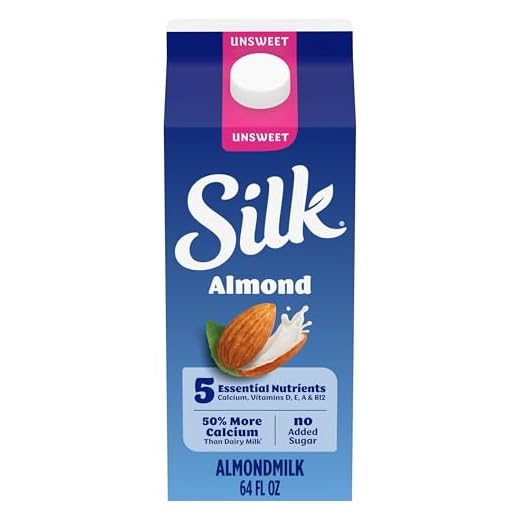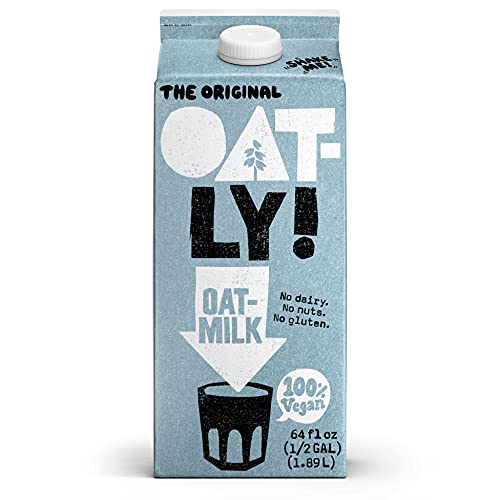Will Oatly’s creamy goodness outshine Silk’s silky smoothness, or is there a dairy-free dark horse waiting to steal the spotlight?
Are you ready to ditch dairy and dive into the world of plant-based goodness? Join us as we pit Oatly against Silk in a battle of creamy, dairy-free delights. Which one will come out on top? Let’s find out who takes the crown in this ultimate showdown!
Best Coffee

A fantastic dairy-free alternative, it excels in versatility and taste, making it a favorite for both coffee lovers and cooks alike. Its creamy consistency is a major plus for those seeking a milk substitute without the dairy guilt.
Best Smoothie

A solid choice for those seeking a low-calorie, dairy-free milk option, it shines in smoothies and cereals with its rich nutritional profile. However, flavor enthusiasts might find it slightly lacking compared to creamier alternatives.
Oatly Oat Milk
Silk Almond Milk
Oatly Oat Milk
Silk Almond Milk
Oatly Oat Milk
Silk Almond Milk
The Creamy Contenders: Oatly vs Silk
In the left corner, we have Oatly Original Oat Milk – a creamy concoction that’s as versatile as a Swiss Army knife in the kitchen. This darling of the dairy-free world boasts a 100% cool for vegans label, making it suitable for the whole plant-based crew. With its oat-based goodness, it’s designed to blend seamlessly into your coffee, cereal, or even your baking adventures. Plus, it’s free from nuts and gluten, so those with dietary restrictions can breathe easy!
On the right, we have the Silk Almond Milk, an unsweetened wonder that’s smooth, creamy, and comes with a nutritional bonus: 50% more calcium than traditional dairy milk. Crafted from a blend of three types of almonds picked at their peak ripeness, Silk doesn’t just stop at great flavor. It’s also gluten and soy-free, making it a solid contender for anyone looking for a light, low-calorie option at just 30 calories per serving.
Both brands bring their unique flair to the dairy-free scene, with Oatly focusing on that rich, creamy texture and Silk championing a lighter, calcium-packed alternative. In this showdown, we’re not just looking for a taste bud tickler; we want to see which of these plant-based powerhouses is the ultimate winner!
Taste Test: The Flavor Face-Off
When it comes to taste, let’s see if Oatly and Silk can bring their A-game and leave our taste buds dancing!
Oatly Original Oat Milk
Imagine a lush, creamy sip that wraps around your palate like a warm hug. Oatly Original Oat Milk excels in texture — it’s thick and luxurious, perfect for enhancing your morning cup of coffee. If you’re a latte lover, this oat nectar is as smooth as your favorite barista’s brew. Plus, it shines when poured over cereal or even in baking, adding that extra richness that some will argue can rival traditional cow’s milk. Just be careful if you’re not a fan of thicker textures; some might find it a tad too voluptuous for their liking.
Silk Almond Milk
On the flip side, Silk Almond Milk offers a lighter, refreshing alternative. With 0 grams of sugar and only 30 calories per serving, it’s like sipping on a creamy cloud — delicate yet flavorful. Its unsweetened profile makes it an excellent fit for smoothies and recipes, unwaveringly taking the back seat to let your ingredients sing. However, if you’re craving a robust flavor experience, some may find it lacks the depth of oat milk. That said, its smoothness in cereal is undeniably delightful—just like a frothy pool of creamy joy.
In the battle of flavors, Oatly brings the richness, while Silk dances lightly on your tongue. Time to find out which vibe resonates more with your palate!
Nutritional Knockout: Which One Packs a Punch?
When it comes to nutrition, both Oatly and Silk offer unique benefits worthy of applause! Let’s break down their essentials and see which contender might just have the edge.
Oatly Original Oat Milk
Silk Almond Milk
| Nutrient | Oatly Original Oat Milk | Silk Almond Milk |
|---|---|---|
| Calories per Cup | 120 | 30 |
| Sugar | 7g (natural sugars) | 0g |
| Calcium | Fortified, approx. 300mg | 470mg |
| Protein | 3g | 1g |
| Fiber | 2g | 1g |
In the nutritional showdown, Silk Almond Milk stars as the low-calorie champion with a calcium boost, while Oatly serves up a creamy delight with fiber and protein. Depending on your dietary goals, you’ll find both options have something to offer in the dairy-free milking pit!
Feature Comparison
Sustainability Smackdown: Eco-Friendly Milks
In our final main section, we’ll explore the environmental impact of both Oatly and Silk. From sourcing ingredients to packaging, which milk is more sustainable? Let’s find out!
Oatly’s Eco Practices
Oatly is not just about delicious oat milk; they wear their environmental heart on their sleeve too. Their production focuses on:
Silk’s Sustainable Approach
Silk also takes sustainability seriously with its almond-derived milks:
The Verdict
Both brands have embraced eco-friendly practices, but with unique focuses. Oatly shines with its commitment to reducing waste and carbon emissions, while Silk excels in sustainable sourcing and responsible farming. In the end, your choice might boil down to whether you resonate more with oats or almonds in this dairy-free garden of delights!
Final Verdict: The Dairy-Free Champion
After an epic showdown of taste, nutrition, and sustainability, Oatly Original Oat Milk takes the crown! Its creamy texture and versatile use make it a delight in every glass.
But why stop at just one contender? Grab a carton of Silk Almond Milk as a refreshing partner in your dairy-free journey. Are you Team Oatly or Silk? Let us know your pick!









The debate is real! I enjoy both for different reasons, but I feel like Oatly has a more robust flavor. Just my opinion!
A robust flavor is definitely something Oatly is known for!
For sure! It really does have that rich taste that’s hard to beat.
I’m honestly just here for the calcium. 😂 Silk wins in that department for me! Oatly is cool, but I can’t get over the price! Oats are cheap, right?
Right?! Oatly is so pricey! I only buy it when it’s on sale.
Calcium is definitely a big factor! Have you tried any of Oatly’s other products?
I tried both in a smoothie, and honestly, I couldn’t tell the difference. 😂 Maybe I’m just not picky, but they both worked for me!
I guess it depends on what you put in! I love a good banana smoothie; it masks everything.
That’s interesting! Smoothies can be a great equalizer. What did you add to your smoothie?
I actually prefer Silk! It’s way lighter and I love that it’s unsweetened. Oatly feels a bit too thick for my taste. Plus, the calcium content is a win for me! 💪 Anyone else on the Silk train?
Silk is great for cereal too! Just enough creaminess without overwhelming it. What do you usually use it for?
Great point, Lily! Silk’s lighter texture does appeal to many. Have you tried mixing it with anything?
I recently tried both, and I have to say, I’m team Oatly! It just tastes more like milk to me. I use it for everything from baking to my morning coffee. 🌟
Awesome to hear, Emma! Do you have a favorite recipe you use it in?
Baking? What do you bake with oat milk? I need some ideas!
I don’t know, guys… I tried Oatly, and it just didn’t sit well with me. Maybe I’m sensitive to oats? 🤷♀️ Anyway, Silk has been my go-to forever!
I think it’s all about what your body can handle. Stick with what works for you!
Sorry to hear you had a bad experience with Oatly! Silk really is a solid choice for many.
I’ve been a die-hard Oatly fan for ages! The creaminess is just perfect in my morning coffee. ❤️ Anyone else feel like Silk just doesn’t measure up? I tried the Unsweet Almond Milk once and it tasted like nut water to me. 😂
Thanks for sharing, Sarah! Oatly really does have that unique texture. Have you tried any of their flavored options?
Totally agree! Oatly adds that nice frothiness too! Have you tried it in smoothies? It’s a game changer! 🥤
I love how Oatly is so sustainable! Their packaging is super eco-friendly. 🌱 Silk is good, but Oatly just feels better for the planet! Who else is into the environmental aspect?
Definitely! Oatly’s commitment to the environment is impressive! Makes me feel less guilty when I drink it.
That’s a great point! Sustainability is becoming more important for many consumers.
I think both have their merits. Oatly for coffee and Silk for cereal! Why not mix it up? But I’ll be honest, I usually just grab whatever’s on sale. 😅
Exactly! Variety is the spice of life! 😂
Mixing them is a good idea! You get the best of both worlds.
As a casual oat milk drinker, I’m not picky, but I found Oatly too sweet for my taste. Is there a version of it that’s unsweetened? I need to cut down on sugar. 😅
I think Oatly’s barista version is unsweetened! It works well in coffee too!
Yes! Oatly does have an unsweetened version. You might want to give that a shot!
Silk is definitely the better choice for cooking! I made a vegan mac and cheese with it and it turned out delicious! Oatly would be too heavy for that. 🍝
That sounds amazing! What recipe did you use?
Vegan mac and cheese? I need that in my life! What’s your secret?
Honestly, can we just agree that both are better than dairy? 🙌 I’m lactose intolerant and these options save my life!
Yes! I feel you! I used to love dairy but now I can’t imagine going back.
Totally! Dairy-free options are a blessing for so many people.